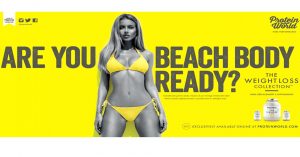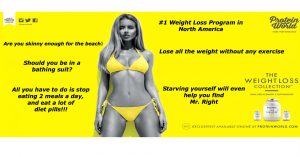An Anaylsis of the Protein World Ad “Beach Body Ready”

I chose to deconstruct this ad based on many themes that presented themselves when I first viewed the image. The model is a young, caucasian, toned, curvy blond woman, you notice her body is standing tall with her arms slightly behind her. This illustrates confidence by her gaze looking out straight to her viewers. The message asks “Are You Beach Body Ready” which influences consumers to think that to present their bodies in public they need to fit a particular body image. The campaign focuses their marketing towards women, by using a young female model in a yellow string bikini. This portrays to women that this is the image and body type they should be, and to men this is the body type they should expect of a woman. The campaign pairs the visual of a thin, toned young white woman with weight loss products that implies to achieve that beach body a person needs to use supplements to lose weight. Correia (2014) stated that “the fundamental problem with most weight-loss advertising is that there is a powerful incentive for advertisers to state expressly, or at least to imply, that people do not have to change their eating patterns” (as cited in Hobbs, Broder, Pope, & Rowe, 2006).
This type of marketing influences negative body images, which among young women especially teens can be very detrimental. According to the National Eating Disorders Association “People with negative body image have a greater likelihood of developing an eating disorder and more likely to suffer from feelings of depression, isolation, low self-esteem, and obsessions with weight loss”. For consumers who hold a negative body image, the expectation that to present oneself on a beach they must fit a specific body type, creates anxiety. This anxiety causes negative self thought, resulting in comparing or even criticizing their bodies to the one showed on the campaign. Warner (2017) argues that “These branding techniques, relying on emotional rather rational appeals, are used in the attempt to achieve automatic, unreflective trust in the branded product” (p.18). This type of advertising relies on emotional consumers to purchase a product that to the consumer is unaware if it is effective or even safe to use. It also emphasizes poor eating habits that last short term and can cause healthy issues.
References.
Correia E. (2004) The Federal Trade Commission’s regulation of weight-loss advertising claims. Food Drug Law J . vol. 59 (pg. 585-594)
Hobbs, R, Broder, S, Pope, H, Rowe, J. (2006) How adolescent girls interpret weight-loss advertising. Health Education Research. 21(5). 719-730. https://doi.org/10.1093/her/cyl077
What is Body Image? (2016) National Eating Disorders Association. Retrieved from https://www.nationaleatingdisorders.org/what-body-image

My reconstruction of the Protein World ad was to focus on women to think about the harmful ideals it portrays. The idea behind the marketing was to focus on young women dieting towards unhealthy body ideals, I wanted to leave the original model because I want “consumers” to see the hegemonic influences it continues to portray. The slogans I installed onto the campaign are meant to put focus on what the ad is really trying to say to consumers. Messages of “Are you skinny enough”, “should you be in a bathing suit”, “You don’t even need to exercise” and lastly “all you have to do is stop eating two meals a day and eat diet pills” are meant to show how ridiculous the weight loss program supports unhealthy body ideals. This form of dieting does not teach young adults especially women as portrayed in this ad to develop healthy eating patterns. To maintain healthy weight, but to also carry a healthy body image of oneself the need for instant gratification by yo-yo style dieting is ineffective and short term. Advertisements such as these, influences consumers to believe a stereotype such as this conveys confidence, success, wealth and happiness which really causes women to feel insecure and anxious of their self worth.
Lastly, I also included the phrase “starving yourself will even help you find Mr. Right”. The idiocrasy of that phrase was to solicit an emotional response that angers women. My focus was to point out the many messages women are bombarded with such as to be successful and happy you must be skinny, wealthy, married and beautiful.